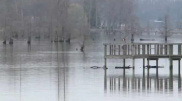More From The Heartland: Montana, Oklahoma, North Dakota Debate Keystone XL Pipeline
As the State Department wraps up its week-long community meeting blitz around the country, supporters and opponents of the Keystone XL pipeline continue to primarily debate two issues: jobs and the environment.
Just like the meetings in Kansas, Nebraska and Texas earlier this week, advocates of the Keystone XL pipeline often outnumbered those against it.
Issues argued at these meetings will be presented to Secretary of State Hilary Clinton, who will decide the fate of the pipeline. She has said previously that her office is "inclined" to approve its construction.
About those jobs...
A popular sentiment among supporters revolved around the 20,000 or so jobs TransCanada and State officials have promised from the pipeline.
Billy Strawn in Oklahoma supported the project because of the jobs it would allegedly create.
“It will put a lot of people to work,” he told The Oklahoman.
Many at subsequent meetings echoed the same opinion.
However, in North Dakota, actress Margot Kidder directly repudiated the claim. She maintained that it would only bring about 1,200 jobs, and most of them wouldn't be local.
"The people who want this pipeline built ... are lying to us about the jobs they create in our communities," she said, according to the Grand Forks Herald.
Although reports fail to indicate whether she was referencing a study released released this week by the Cornell University Global Labor Institute, it seems to validate her claims. The study is a little more optimistic than Kidder -- it says that the pipeline may create between 2,500 to 4,650 jobs -- but it says most of those jobs will be temporary and not local.
The report goes on to state inaccuracies in the amount TransCanada will spend on the project, flaws in another study by The Perryman Group and the foreign sources for the steel the pipeline will require.
"It is unfortunate that the numbers generated by TransCanada, the industry, and the Perryman study have been subject to so little scrutiny, because they clearly inflate the projections for the numbers of direct, indirect, and long-term induced jobs that KXL might expect to create," it stated.
Environmental question
If it wasn't about jobs, much of the conversation turned to consider the environmental impact the pipeline may have on the area.
According to BusinessWeek, Oklahoma Sierra Club Chairman Charles Wesner argued that the pipeline is an environmental ticking time-bomb.
“Pipelines are notorious for leaking,” he said. “It's not a matter of if; it's a matter of where and when. It's going to cause a great deal of destruction, somewhere at some time.”
And besides the pipeline itself, Wesner said the means of extraction from the tar sands in Canada will produce an unprecedented amount of greenhouse gas emissions and destroy acres of forestry. Others have stated that the oil sands are more corrosive than crude oil, upping the possibility of pipeline problems.
In South Dakota, environmentalists voiced similar concerns.
“I think protecting a livable climate is in the national interest,” said Matt McGovern of the National Wildlife Federation chapter in Sioux Falls.
Chuck Nerud, a landowner in Montana, also spoke about the possibility of an oil leak.
"I don't like to be a pessimist, but there are a lot of things that can go wrong and I'd rather not see them," Nerud said.





